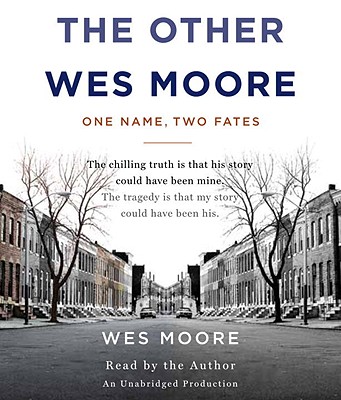
Summary:
The Other Wes Moore is a story about the lives of two people with the same name, but it seems as though each of them has been led down a different path. They started out in similar situations, made good and bad decisions, had decisions made for them, and some way, somehow, one Wes Moore overcame all the difficulties while the other Wes Moore now has to live a life of difficulty in prison. The book is told in first person point of view by the Wes Moore that overcome life's difficulties. In the Baltimore Sun, they ran a newspaper about the author and how he received the Rhodes Scholarship. In the very same newspaper, series of articles were ran about the other Wes Moore stating that the police were trying to locate him on charges of robbery and alleged killing. Curious about the same-named felon and shocked at the unsettling coincidence, the Rhodes Scholar Wes Moore sought out the other Wes Moore writing him a letter asking questions such as "Who are you?" and "How did this happen?"
Use of Terms:
The author, Wes Moore, uses flashback throughout the entire book. He uses this to compare his life with the other Wes Moore's life. These flashbacks compared with the other Wes Moore's childhood stories create pathos or emotional appeal. The stories that are presented in the book can be a hard pill to swallow to the reader because (odds are) the reader has probably never had to deal with the situations that the author and the other Wes Moore have had to endure. If the reader has had to deal with situations like the ones presented in the book, then they are able to empathize with the author and the other Wes Moore. One of the situations presented is when Tony, the other Wes' brother, finds out that Wes is gaining money due to being in the drug business. The author writes, "Wes was so confused. He loved and respected his brother. Tony was the closest thing Wes had to a role model. But the more he tried to be like his brother, the more his brother rejected him. The more he tried to copy him, the more Tony pushed back. Wes wanted to be just like Tony. Tony wanted Wes to be nothing like him." Even though the syntax is short and simple, the weight of the author's words pounds the reader in the heart. In the beginning of almost every chapter, Wes Moore writes out the dialogue between the other Wes Moore and himself to establish credibility or ethos. His gains this credibility because through the dialogue that takes place, Wes Moore's actions reveal to the reader that he is interested in and cares about the so-called felon that has the same name as him. This kindness that is shown to the other Wes Moore from the author suggests that the reader can trust Wes Moore and as the book goes on, the other Wes Moore.
Personal Review:
Personally, I enjoyed the book because even though I knew that The Other Wes Moore was a nonfiction book, the author eloquently described the struggles of life that some people don't ordinarily see. I personally felt connected to the book mostly because I have been in the ghetto of Baltimore for missions trips, and when you see troubled people, it makes you sympathize with them and prompt you to reach out a helping hand to them. I believe the book teaches that the influences and environmental factors around you make you who you are and may even determine what you will become in the future. Another piece of information that the book implies is that you influence other people around you whether you think you do or do not. Just for that implication alone, I would recommend anyone to read The Other Wes Moore.
This is such a powerful concept! After reading this and works like _Frankenstein_, where do you stand on the nature versus nurture?
ReplyDelete